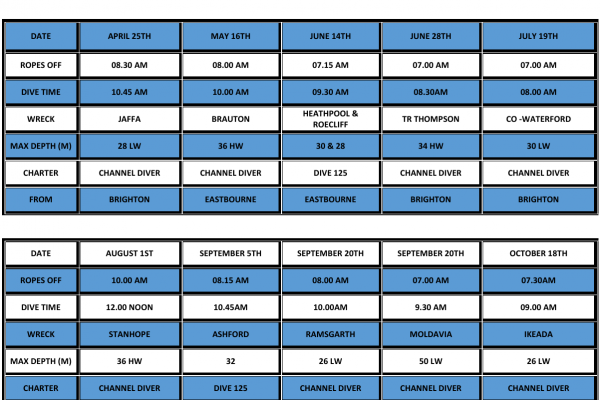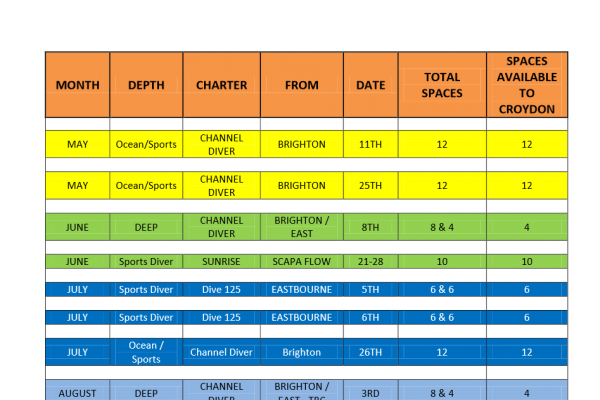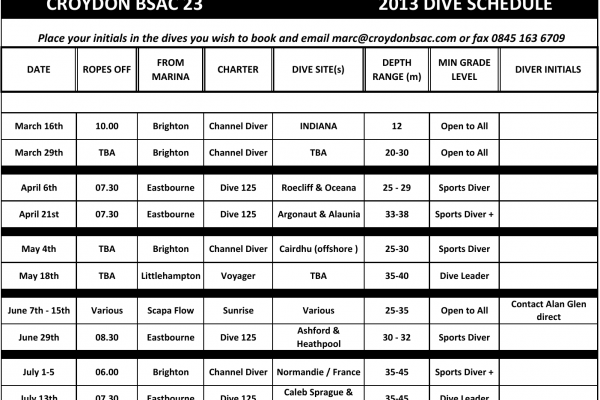Most of the diving we do in the UK is on wrecks. A rich maritime history including two World Wars have provided us with some of the best wreck diving in the world, a fact not lost on the divers of Croydon BSAC 23! Generally we go to known sites, by which I mean wrecks that have generally been identified, well documented and are regularly visited by dive boats. Examples of these in our usual stomping ground of Brighton include the City of Waterford, Fortuna and the TR Thompson. But where do you go if you want to find out more information about these wrecks or have found a new wreck and want to research it? Well, you could find the bell, but if you’re not that lucky then here are a few resources that are of use to the wreck researcher:
Books/Journals
Dictionary of Disasters at Sea in the Age of Steam, Charles Hocking
Two volumes covering all steamship sinkings from 1824-1962. Gives ship details including cargo and any relevant sinking information along with last reported position. Diving information isn’t included as this book is really about ships and their sinking rather than being a diving guide. An excellent book, which at one time was available online until the Lloyd’s legal department had a word in the ear of the person who made it available. I’ve heard it rumoured that some people managed to save the whole thing as a PDF, so if you know one of those people you might still be able to get a copy…
Dive — series, published by Diver
 The Dive — series are published by Underwater World Publications, an offshoot of Diver Magazine, and provide diver-specific information on areas all around the UK coast. The South coast volumes that are of particular use to us are: Dive Kent, Dive Sussex, Dive Wight & Hampshire, Dive Dorset, Dive South Devon and Dive Cornwall. They are generally well written and include position, history and diving information on each site along with additional information like local boats and launching facilities. These are useful guide for known sites, but be warned – they are now getting rather old and some of the information isn’t accurate (wrong identifications; inaccurate positional information, outdated diving info etc).
The Dive — series are published by Underwater World Publications, an offshoot of Diver Magazine, and provide diver-specific information on areas all around the UK coast. The South coast volumes that are of particular use to us are: Dive Kent, Dive Sussex, Dive Wight & Hampshire, Dive Dorset, Dive South Devon and Dive Cornwall. They are generally well written and include position, history and diving information on each site along with additional information like local boats and launching facilities. These are useful guide for known sites, but be warned – they are now getting rather old and some of the information isn’t accurate (wrong identifications; inaccurate positional information, outdated diving info etc).
Lloyd’s Confidential Index
 Lloyd’s Confidential Index is the definitive industry ownership reference tool and has been published twice-yearly since 1886. This work allows you to instantly identify every vessel and company associated with an owner, enabling you to get an appreciation of a vessel’s providence – details that not available from any other source. Information included: Entire fleet listings by beneficial owner; Full vessel history including former names; Voyage records over the past 12 months; Key vessel characteristics; Full address details of
Lloyd’s Confidential Index is the definitive industry ownership reference tool and has been published twice-yearly since 1886. This work allows you to instantly identify every vessel and company associated with an owner, enabling you to get an appreciation of a vessel’s providence – details that not available from any other source. Information included: Entire fleet listings by beneficial owner; Full vessel history including former names; Voyage records over the past 12 months; Key vessel characteristics; Full address details of

each company; Complete total loss and serious casualty history. The publishers of Lloyd`s Confidential Index prohibit the use of a volume by members of the public until thirty years after publication, the Guildhall library has a full collection of those available to the public.
Lloyd’s Register of Ships
Lloyd’s Register of Ships is the most useful source of data on the world’s ships. LR was originally a guide for merchants and underwriters on the condition of ships, it includes ship-specific data including dimensions, tonnages, particulars of classification, port of survey, build information, port of registry, flag, engine details etc. All of which are very useful when trying to identify an unknown wreck.
 Shipwreck Index of the British Isles, Richard Larn
Shipwreck Index of the British Isles, Richard Larn
This is a 7 volume set with each volume covering a geographical area. For each area of coast every known wreck from about 1100 AD is supposedly listed.
These are large volumes that contain a wealth of information, but in many cases the wreck identifications have been found to be wrong. An excellent starting point for research, but information should be checked against other sources. These volumes are no longer published, but often become available on ebay – except the one covering Sussex, which is as rare as rocking-horse shit. If you see a copy going then buy it.
South Coast Shipwrecks off East Dorset and Wight 1870-1979, Dave Wen des
des
This excellent book by diver and charter boat skipper Dave Wendes covers 176 wrecks in the Dorset/Wight area all researched by the author. It includes precise positions for 127 of the wrecks and descriptions of how each wreck was identified. The wrecks are listed in date order of loss and most are illustrated with 125 black and white photographs, many previously unpublished.
This book is essential reading for all wreck divers. The nice thing about this book is that it covers some of the deeper wrecks now available to those of us that are trimix qualified, something that most of the other books listed here do not do
It is one of the most recent, and in my opinion best, wreck diving books about. A steal at 25 quid.
 World War One Channel Wrecks, Neal Maw
World War One Channel Wrecks, Neal Maw
Another excellent work that concentrates on our main diving area, the English Channel. This book is divided up into areas along the south coast and provides a history to the sinking of every WW1 wreck in each area, from trawlers to battleships. Ship details are given along with cargo carried and information on lives lost. Positional information is approximate as it is listed from the official sinking position.
Another one that’s well worth the cover price of £25.
Online Resources
Divernet Wreck Tours: http//:www.divernet.com
Although of no use if you’re researching a new wreck, these detailed diving guides written by John Liddiard provide reasonably up-to-date information on over 120 wrecks in the UK. Large wreck sketches are included along with a suggested route to follow to get the best out of the dive. These are especially useful if you’re planning to visit a known site you haven’t dived before or for showing first-timers the plan for the dive.
Miramar Ship Index: http://www.miramarshipindex.org.nz/
Historical database listing both merchant powered ships of about 100 gross register tons and above, naval ships of even smaller tonnage displacement and also composite, iron & steel sailing ships. The website is upgraded about the turn of each month and currently contains information on over 200,000 vessels.
PortcCities Southampton: http://www.plimsoll.org/
Excellent online resource providing detailed guides on wreck research along with Board of Trade Wreck Reports and information on ship types, shipping lines, ports and wrecks.
Register of Ships: http://www.reach.net/~sc001198/Lloyds.htm
This searchable database contains registration details of a vessel such as the rigging, the tonnage, dimensions, propulsion, owners and her Master. These have been transcribed from the Lloyd’s Register of British and Foreign Shipping from 1764 up to 2003, by Gilbert Provost with assistance from Pauline Joicey.
Shipwrecks Database: http://www.shipwrecks.uk.com/
This was touted as an online version of the Shipping Index of the British Isles but for various reasons has never gone live. Have been largely superseded by the Wrecksite.
South West Mafia Forum (inc excellent wreck database): http://www.southwestmafia.com/
Online forum for diving chat that, thanks to a few dedicated individuals, provides wreck information including positions, diagrams, ship history and guides to ship construction. These forum posts are written by divers who are actually out there doing it – diving and identifying new wrecks, mostly in the Lyme Bay and Plymouth area. Very useful for the most up-to-date research that is currently being conducted.
Steamship Pictures: http://www.photoship.co.uk/
Huge photographic library of steamship pictures from very old to very new. Also containg ship paintings and a useful list of shipping compaines and their vessels.
Uboat.net: http://uboat.net/
U-boat history – useful even if you’re not in to diving subs as the information provided gives technical details, sinking information, U-boat operations, Allied forces & warships and the Pacific & Atlantic U-boat wars.
Wrecksite: http://www.wrecksite.eu/
Probably the best and most up-to-date wreck resource around. Historical and current diving details are included and for a small fee (€25) the UKHO Wreck Reports can be accessed diving survey and positional information. This really is a bargain as to buy this info from the UKHO used to cost about £3 per wreck. Information can be added and updated by any subscriber and some excellent ship and artefact images are include with each wreck entry. An absolute must.
Libraries etc
Serious researchers will at some point need to conduct research away from their computer or personal book collection. The following libraries have extensive collections of shipping and wreck related books:
Guildhall Library
A major collection of marine material has been deposited with the Guildhall Library by Lloyd’s of London, and this is especially useful for tracing information on merchant vessels and shipping casualties. The only biographical material is contained in the Lloyd’s Captains’ Registers, 1869-1948, which include both Merchant Navy masters and mates. These are available for consultation in the Manuscripts Section’s website.
There are no photographs or other illustrations in the Lloyd’s marine collection – for these you should contact the National Maritime Museum. However, they do have many related works on merchant fleets and shipping companies, shipbuilders, disasters at sea (including, of course, the Titanic), and all things maritime. Of particular use are the Lloyd’s List back issues and the complete set of the Shipwreck Index of the British Isles. The library is open to visitors during office hours, is easy to find and the staff are very helpful.
National Maritime Museum: http://www.nmm.ac.uk
This collection holds data on all aspects of maritime history including ship models, charts and map, flags and paintings. The website contains a series of very useful research guides and online databases. Of particular interest is the large collection of ship models, ships plans, paintings and photographs – very handy for finding the location of that elusive bell…
Government or regulatory bodies that may be of use include
English Heritage / Advisory Committee on Historic Wreck Sites: http://www.english-heritage.org.uk
Concentrate on maritime archaeology and the protection England’s maritime heritage. Information on the website includes listed protected wreck sites.
Receiver of Wreck: http://www.mcga.gov.uk/c4mca/mcga07-home/emergencyresponse/mcga-receiverofwreck.htm
The main task of the Receiver of Wreck is to processes incoming reports of wreck, in the interest of both salvor and owner. This involves researching ownership, liaising with finder and owner, and other interested parties such as archaeologists and museums. If you lift ANYTHING from the seabed you should report it to the Receiver of Wreck, it is against the law not to. It’s a simple process of completing a short form and after doing so it’s most likely you will be allowed to keep the artefact. If the owner is sourced and would like their artefact back then they will have to settle salvage with you.
UKHO: http://www.ukho.gov.uk
Produce charts and navigations resources for the UK. These are the people who survey the seabed and gather and chart any obstacles, including wrecks. The UKHO can supply specific information on any wreck, type of ship, size of ship etc in any area you’d like. However, the UHKO reports are now available online via the Wrecksite which works out a lot cheaper.





Comments(5)
Rick says:
10th October 2009 at 11:35 amexcellent post Paul
must get that Dave Wendes book
Totally agree on the comment about Wrecksite
croydonbsac says:
15th November 2009 at 4:32 pmSince writing this I have found an excellent thread on South West Mafia covering wreck research in much more detail: http://www.southwestmafia.com/forumswm/showthread.php?t=4348
croydonbsac says:
15th November 2009 at 7:39 pmLooks like someone has uploaded a pdf of Charles Hocking’s Dictionary of Disasters at Sea in the Age of Steam: http://www.megaupload.com/?d=LJ076IBO
croydonbsac says:
18th November 2009 at 9:37 pmLots of interesting info on Weymouth wreck research on Grahame Knott’s website: http://www.theshipwreckproject.com. Check out the forum for lots of up to date info.
croydonbsac says:
13th February 2011 at 7:26 pmMore good stuff from SWM with details of what’s available in Lloyd’s Registers:
http://www.southwestmafia.com/forumswm/showthread.php?p=57988
We even get a mention! (Thanks guys!!)